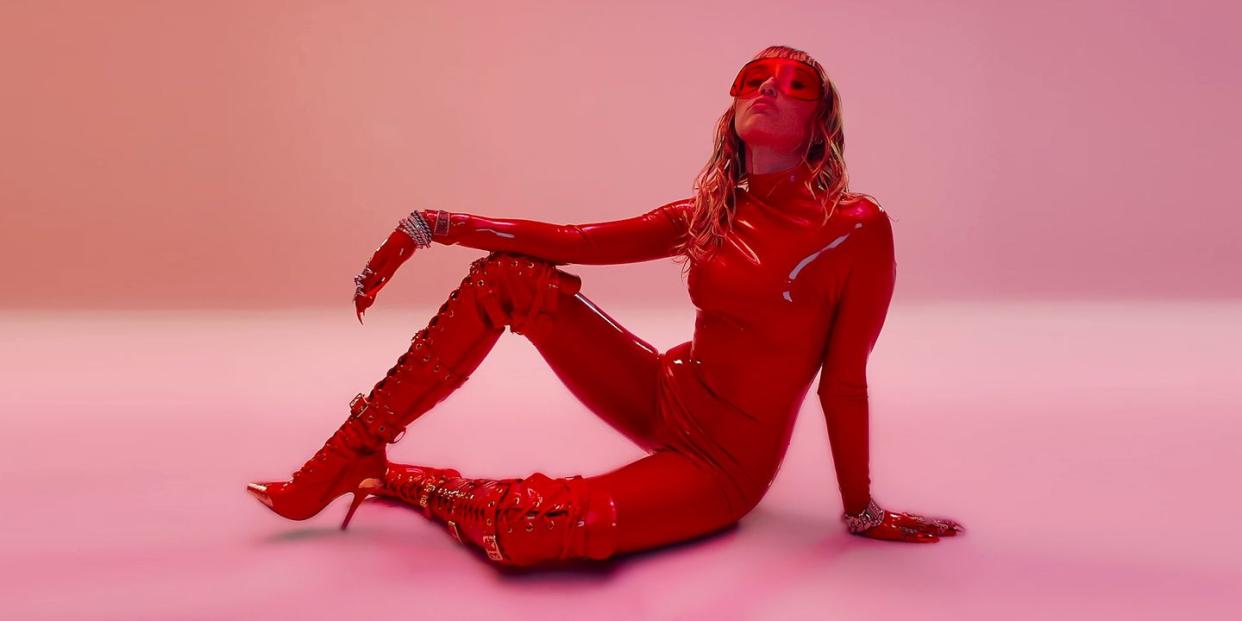Sorry, Haters: Miley Cyrus Is Right—Virginity Is *Totally* a Social Construct

Earlier this week, Miley Cyrus (who’s hardly new to questioning societal norms) took some flack on Instagram for posting the message “virginity is a social construct.” Fans attacked her with comments saying that she was being a bad role model, that she didn’t know what she was talking about, and that her statement was straight-up false. And I’m sorry to Miley followers who think she’s wrong because “virginity is in the Bible” or it’s “biology,” but I’m team Hannah Montana—virginity is 100 percent a made-up idea.
A post shared by Miley Cyrus (@mileycyrus) on Jul 9, 2019 at 8:08am PDT
But let’s back up so we’re all on the same page here, shall we? ICYDK, a social construct is a concept that’s been created by society, and because it’s not inherently natural like breathing or sleeping, it only lives on because it’s consistently enforced by human behavior. Social constructs that have been enforced for a really long time usually become social norms, which is why people continue to uphold them—they’re an important part of how we understand ourselves and the rest of society. And not to get too deep on y’all, but yes, this means a lot of the things that are inherent to the way we live our lives are social constructs, like gender. Think about it: There’s no inherent reason why men and women have such different roles in society (a Y chromosome doesn’t mean anything beyond different anatomy!). Aka if we stopped believing in the power of a social construct, it would essentially cease to exist.
And even though that’s already a pretty mic-drop idea, let’s really get into this: The whole concept of virginity as we know it isn’t based on facts or science. If virginity were actually when the hymen breaks, then it wouldn’t always have to do with sex—sometimes people’s hymens break for other reasons, and sometimes the hymen doesn’t break the first time someone has sex. So yeah, that whole “biological” argument doesn’t work—sorry, science! Don’t believe me? According to the World Health Organization, “the term ‘virginity’ is not a medical or scientific term.”
Let’s be real—does anything about you actually change after you have sex? Sure, maybe your life experience or mentality (and the fact that you might have a new hobby, lol), but those things also change after your first job or having kids—why so much emphasis on this thing in particular? What I’m trying to say is, there is no inherent meaning or value in virginity. The only reason it’s assigned so much cultural weight is because it’s what we choose to believe, and people have chosen to believe it since biblical times. One reason it originated (besides the whole “Is that reeeally my baby?” biological imperative) is because it’s a concept used to control women and their bodies. I mean—besides the Jonas Brothers circa 2008, do you see any guys obsessing over how to protect their virginity?
A post shared by Miley Cyrus (@mileycyrus) on Jul 9, 2019 at 8:07am PDT
Not to mention, virginity means different things to different people—is a sexually active lesbian who has never had penetrative sex with a penis a virgin her whole life? And also, how do oral and anal sex play into all this? Or people who identify as trans? The more we think about the concept of virginity, the more subjective it becomes, leading back to: Virginity isn’t a real thing, it’s just an idea that people came up with and now believe in.
But the thing about social constructs is that when they’re enforced, they have real consequences. As an extreme example, in Afghanistan, “virginity tests” are legal to ensure that girls are eligible for marriage, and nonvirgins can be imprisoned for adultery. On the more familiar side of the spectrum, virginity is commonly associated with purity and goodness. And you might be like, well, I don’t really see the problem with that! But associating purity with virginity implies that to “lose” it means you’re somehow impure, and that’s slut-shame-y and sexist as hell, because again: Most of the time, it’s women’s virginity that’s heavily surveilled. Emphasis on a woman’s virginity is a form of gender discrimination, no matter how innocuous it seems. And I’m not dragging anyone who considers themselves a virgin by their own definition—I’m just saying let’s all stop believing there’s any deeper value OR shame in no longer being one. It’s just a personal choice that’s no one else’s business.
As a Miley fan, what I think she’s trying to get at with her Instagram is that women should be able to do what they want with their bodies without punishment, stigma, or guilt, and getting there entails breaking down the cultural norms that are enforced to keep women down. And that deserves all the likes.
('You Might Also Like',)

